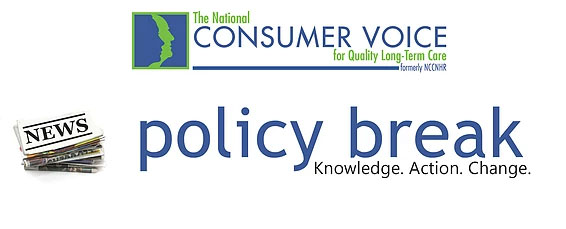
The Elder Law and Life Care Planning Center is bringing you this breaking legislative update from the National Consumer Voice for Quality Long-Term Care.
What is PDPM? In October 2019, the Centers for Medicare and Medicaid Services (CMS) implemented a new payment model for skilled nursing facilities (SNFs), the Patient-Driven Payment Model (PDPM). PDPM is described by CMS as a patient-driven care model that focuses on the diagnoses and characteristics of the patient rather than the services, including the therapy services, provided to them. The system creates different financial incentives for SNFs than previous models. For instance, facilities now receive a higher reimbursement rate for residents who are more clinically complex, including those who need ventilators and/or IV medications, are severely cognitively impaired, and residents with depression. At the same time, the more therapy a resident needs, the less the SNF is paid.
How Does PDPM Differ from RUGS? PDPM is a departure from the prior reimbursement model, Resource Utilization Groups (RUGS) which incentivized SNFs to provide therapy – paying higher rates the more therapy a patient received. Multiple reports from different agencies and organizations over the years have recommended changes to RUGS, finding that the therapy billed was not in line with residents’ needs. CMS acknowledged that RUGS led to a system where SNFs were providing therapy regardless of residents’ individual characteristics and needs. While therapy was rewarded under RUGS, under PDPM the opposite is now true, as reimbursement rates are higher for residents who receive little or no therapy.
What is the Impact of PDPM To-date? Upon implementation of PDPM, there was an immediate change in the types and amounts of therapy residents received – seemingly tied directly to the change in payment models, not patient progress. SNF’s laid off thousands of therapists and cut their hours. Remaining therapists have been encouraged to work faster, spending less time with individual residents. Therapists saw their time with residents who had been progressing cut drastically after October 1, 2019. Additionally, there has been a move away from individual therapy towards group therapy. While CMS considers individual therapy the most appropriate mode of therapy for most residents, PDPM authorizes that 25% of therapy be group therapy and SNFs have followed suit – in some cases mandating that 25% of therapy be group therapy regardless of what might best suit each resident.
Potential Issues Under PDPM, Medicare has a “declining per day payment rate”, which means that a facility is paid more on the first day of a patient’s stay than on the last and lengths of stay exceeding 15 days bring in lower rates. There are concerns that this could incentivize SNFs to discharge residents before they are physically ready to leave the facility and without proper accommodations made for their continued care. With these changes, SNFs are also incentivized to seek out residents with higher rates of reimbursement — residents with depression, residents who are severely cognitively impaired, and residents who are clinically complex, such as those in need of ventilators. These types of residents, however, require experienced staff with specialized training, and some may require special equipment. Facilities will need to ensure that they have the staff and training programs in place to properly serve these populations, so that residents receive the care they need.
What Should Advocates Look For? Pay attention to and document changes occurring in nursing homes:
-
Ask residents if their therapy plans have changed. Specifically, are there residents who are no longer receiving the therapy they need? Have had their therapy times reduced? Have been moved to group therapy when individual therapy was working for them?
-
Encourage residents to ask about and document these changes. Ask the facility why these changes have occurred.
-
Speak with therapists. Ask them what changes they’ve experienced in the provision of therapy services and the impact of those changes. Ask if they believe they have residents whose care has been compromised as a result of these changes, and why.
-
Pay attention to discharges to see if there is a pattern of Medicare residents being discharged faster than they were previously. Pay attention to the 15-day marker. Note whether residents received notice of the end of Medicare coverage and/or adequate notice of discharge. Were the residents notified of their right to appeal any denial of Medicare coverage?
-
Note if certain facilities have recently started admitting a different population of residents, such as individuals requiring ventilator care. Ask if the facility has completed a facility assessment to determine that it has the resources to care for these residents. Determine if staffing levels have changed to reflect the admission of residents with special care needs and ask what additional training is being provided to staff to care for these residents. Talk to residents/families about the care they are receiving and if they believe it is adequate. Share concerns with the licensing agency as appropriate.
For more information on PDPM:
-
Visit the Center for Medicare Advocacy’s website.
-
View the Consumer Voice’s webinar on this issue.
-
Download webinar slides only.
-
See a PDF version of this Policy Break.





















0 comments